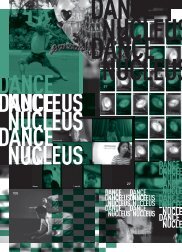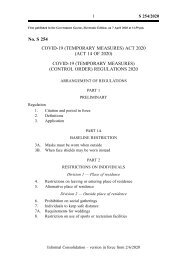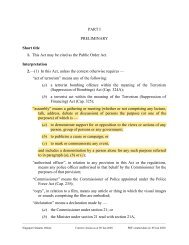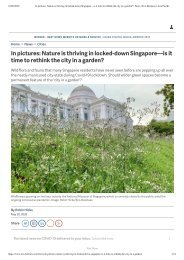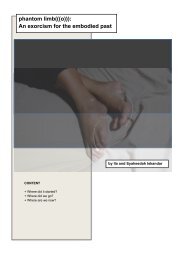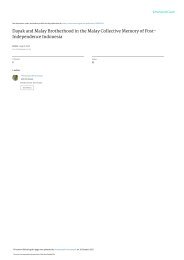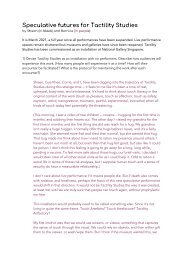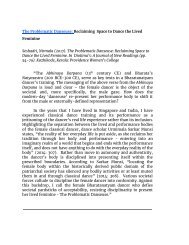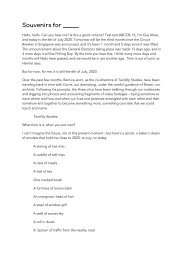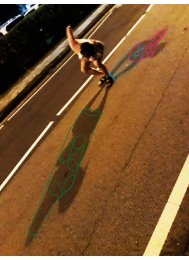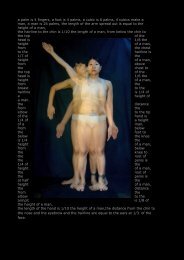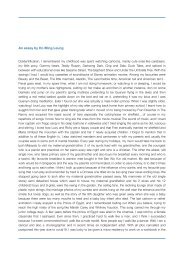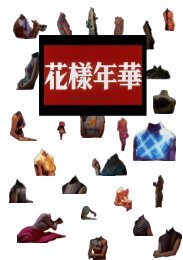Critical Path Digitalmeetup_Transcript
Create successful ePaper yourself
Turn your PDF publications into a flip-book with our unique Google optimized e-Paper software.
Charemaine Seet<br />
Well this is in a way true everywhere. But I feel like through my life I’ve been asking too many<br />
times permission to be accepted as a dancer or an artist or a human being. It’s over now. I’m<br />
saying what I am and that’s it. But I get what you’re saying, if you want funding and want people<br />
to take you seriously, you have to play the game.<br />
Lu Shirley Dai<br />
There’s a question I want to propose to the whole group about the relevancy of Miguel’s article<br />
to all of us. That’s probably one of the reasons Charemaine arranged this group, as we all had<br />
experience studying, working in America mainly and we are all Asian faces. I want to ask about<br />
the relevancy of identity politics for Asian people, with our ethnicity culture? I have this idea of<br />
“am I being brainwashed by American identity politics?” and “what is my position and my directions<br />
in my creative process, since especially now I am not in the States.”<br />
I have been reading this article from a Chinese professor talking about what is Asian-ness,<br />
about the concept of universality as particularity and she was actually proposing forming an<br />
Asian theory which is generated from the Asian history, but is based on empirical reasonings<br />
and definitely very different from Western concepts about universality. So, I’ll stop here, and I<br />
am curious to hear about everybody’s thoughts.<br />
Bernice Lee<br />
I think when I read the article, I was emotionally connected to what he felt about race and his<br />
identity. But I was reading it in an abstract way and applying it to myself in a sense of for me<br />
it’s about how we relate to power and what other different contexts that creates his reality. For<br />
example, in Singapore, like if you come from a Malay dance community, there is a different type<br />
of power there and people play with it in different ways to create a relevance for themselves in<br />
the kind of cultural landscape.<br />
So, I was just reading his article in the lens of how am I working with my reality and there’s<br />
privilege in my world in the sense of. Yes, I’m Chinese, I come from a certain educational background<br />
but also there’s other reality which is that like the expectations on me as an individual<br />
were quite indifferent growing up and that’s very specific and it’s not purely about race and it’s<br />
not purely about identity. It’s about like let’s say the family or just the smaller social circle. So, it<br />
was relevant in that way not necessarily in the history of Blackness and Latin-ness in you know<br />
in America. I think the emotion is different here in Singapore, which is multicultural, is cosmopolitan.<br />
It has all these things about Asian-ness and Western-ness, it’s been in my head since<br />
birth basically and I think there is something in it that captures the sort of complexity of the<br />
experience.<br />
Justine Shih Pearson<br />
Faye’s tears… that’s to me the point of this article—and it is the same as when I say that everybody’s<br />
doing cultural work. Because the point is that in fact we don’t live in a vacuum. We all<br />
live in particular inherited power structures, and power structures that we participate in making<br />
and holding up, or not, or we’re trying to undermine or whatever.




